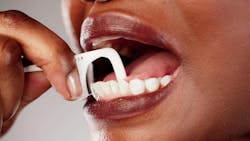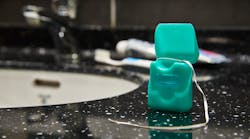This new floss can measure stress levels
Researchers at Tufts have recently developed a revolutionary type of dental floss pick that uses built-in sensors to track and measure various health conditions in its users, including stress.
But why stress?
Stress can be indicative of more serious, underlying health problems such as increased blood pressure, cardiovascular disease, decreased immune function, depression, and anxiety. Current stress tests rely on self-evaluation through patient questionnaires and psychological evaluations, which may be imprecise.1
Sameer Sonkusale, professor of electrical and computer engineering, designed a type of floss pick with his team that is aimed at sensing saliva. Saliva contains cortisol, which is a common stress hormone.
Cortisol is in charge of regulating blood pressure, controlling the sleep/wake cycle, keeping inflammation down, and managing the body's breakdown of carbohydrates, fats, and proteins.2
Sonkusale said: "We didn't want measurement to create an additional source of stress, so we thought, can we make a sensing device that becomes part of your day-to-day routine? Cortisol is a stress marker found in saliva, so flossing seemed like a natural fit to take a daily sample."1
Here's how it works
When someone uses the pick, their saliva is fed through a narrow channel in the floss and drawn into the pick handle and an attached tab. From there, it spreads across electrodes that detect cortisol. This cortisol recognition technology-electropolymerized molecularly imprinted polymers (eMIPs)-has been around for 30 years. Essentially, eMIPs create a "cast" of sorts around the cortisol molecule that can retain its chemical shape, thus preserving the chemical "memory" of the cortisol.1
These versatile eMIP molds can also detect and monitor estrogen for fertility tracking, glucose for diabetes, or signs of cancer.
More stressed than ever
This technology is important because stress in the United States is on the rise. A 2023 survey by the American Psychological Association asked adults to rate their stress level on a scale of one to 10, and nearly a quarter of respondents (24%) placed their average stress levels between eight and 10. This is a significant increase from 19% in 2019.2
Sonkusale and his team are currently working on bringing their product to the market. If individuals are able to purchase this floss and monitor their stress more easily and efficiently, it has the potential to prevent the onset or worsening of serious health conditions.
References
-
Silver M. A dental floss that can measure stress. TuftsNow. May 23, 2025. https://now.tufts.edu/2025/05/23/dental-floss-can-measure-stress
-
Stress is on the rise. How can you manage it? Dartmouth Health. March 13, 2025. https://www.alicepeckday.org/news/stress-rise-how-can-you-manage-it
About the Author

Sarah Butkovic, MA, BA
Sarah Butkovic, MA, BA, is an Associate Editor at Endeavor Business Media, where she works on creating and editing engaging and informative content for today's leading online dentistry publications. She holds a Master's English Language and Literature from Loyola University Chicago and is passionate about producing high-quality content that educates, inspires, and connects with readers.


